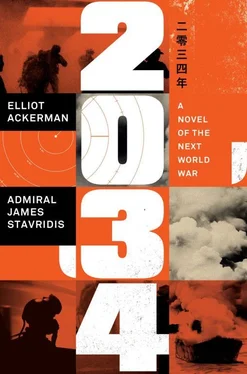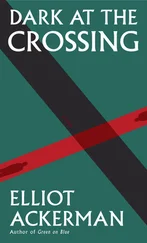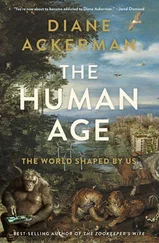This was the only time in his more than thirty years working within the Quds Force that Farshad had ever used his special connection with Soleimani to his advantage. His father, who had achieved the rank of lieutenant colonel, had died subverting an assassination attempt on Soleimani’s life weeks before Farshad was born. The particulars of that incident had always remained shrouded in mystery, but the idea that Soleimani—one of the great protectors of the Islamic Republic—owed a debt to the elder Farshad lent the younger’s career an aura of mystique as he ascended the ranks of the Revolutionary Guards. This mystique endured even after Soleimani’s death, magnified by Farshad’s inherent competence and daring.
The history of his exploits was etched across his body in scar tissue. When advising Syrian government forces in the Battle of Aleppo, a piece of shrapnel from a mortar had sliced a tidy diagonal gash from above his eyebrow to below his cheek. When advancing on Herat after the 2026 collapse of Afghanistan’s last Kabul-based national government, a sniper’s bullet had passed through his neck, missing his jugular and arteries, leaving a coin-sized entrance hole at one side of his neck and the same-sized exit wound at the other. That scar made his neck appear like Frankenstein’s with the bolts removed, which inevitably led to a nickname among the younger troopers. And lastly, in the battle that was the pinnacle of his career, he’d led a regiment of Revolutionary Guards in the final assault to retake the Golan Heights in 2030. In this, his crowning achievement, the one that would earn him his nation’s highest award for valor, the Order of the Fath, the retreating Israelis had fired a cowardly but lucky rocket that had struck beside him, killing his radio operator and severing his right leg below the knee. He still limped slightly from this wound, although Farshad hiked three miles each morning on a well-fitted prosthetic.
The missing fingers. The scar on his face. The leg lost below the knee. All those wounds were on his right side. His left side—apart from the scar on his neck—had never been touched. If his troopers called him “Padishah Frankenstein” (which translated to English as “Great King Frankenstein”), the intelligence analysts at Langley had given him a different nickname, one that corresponded with his psychological profile. That name was “Dr. Jekyll and Mr. Hyde.” Farshad was a man with two sides, the one with the scars and the one without. He was capable of great kindness but also great rage. And that rageful side, the one that easily moved him into his reckless tempers, was very much present now as he waited in the empty office next to the holding cell at Bandar Abbas.
Five weeks before, the General Staff of the Armed Forces had issued Farshad his orders directly. His government planned to down an American F-35 and Farshad was to interrogate the pilot. He would have two days to extract a confession. The plan was to create one of those videos his government could use to shame the Americans. After that, the pilot would be released, and the aircraft’s technology exploited and then destroyed. When Farshad protested that this was the work of an interrogator far junior to him in rank, he was told that he was the most junior person who could be entrusted with so sensitive a task. This could, the General Staff had explained, bring their two nations to the brink of war. The incident his government would precipitate was delicate. And so Farshad had been ordered to remain at this remote airfield for more than a month, waiting for the Americans to fly their plane overhead.
I’ve been reduced to this, Farshad thought bitterly. The most junior man who can be trusted.
Gone were his days of active service. Farshad had accumulated all of the scars he ever would. He remembered General Soleimani’s end. When the Americans killed him, cancer had already developed in his throat and was slowly eating the great commander alive. Several times over those months, the disease had confined his father’s old friend to his bed. During a particularly dire episode, he had summoned Farshad to his modest country house in Qanat-e Malek, a hamlet three hours’ drive outside of Tehran where Soleimani had been born. The audience hadn’t lasted long. Farshad was brought to the general’s bedside, and he could see slow death in the smile that greeted him, the way Soleimani’s gums had receded, the purple-white shade of his chapped lips. He told Farshad in a raspy voice that his father had been the lucky one, to be martyred, to never grow old, this was what all soldiers secretly desired, and he wished a warrior’s death for the son of his old friend. Before Farshad could answer, Soleimani abruptly dismissed him. As he traveled out of the house, he could hear the old man retching pathetically from behind his closed door. Two months later, Soleimani’s great adversary, the Americans, would grant him the most generous of gifts: a warrior’s death.
Waiting in the empty office in Bandar Abbas, Farshad thought again of that last meeting with Soleimani. He felt certain his fate wouldn’t be like his father’s. His fate would be to die in his bed, like the old general nearly had. And if he was in a sour mood that day at Bandar Abbas, it was because of this. Another war was brewing—he could feel it—and it would be the first war in his life from which he wouldn’t walk away with a scar.
A young trooper with a freshly washed and perfectly creased uniform stood at the door. “Brigadier Farshad, sir…”
He looked up, his gaze eager to the point of cruelty. “What is it?”
“The prisoner is ready for you now.”
Farshad stood slowly. He pushed his way past the young trooper, toward the cell with the American. Whether he liked it or not, Farshad still had a job to do.

21:02 March 12, 2034 (GMT-4)
Washington, D.C.
Sandy Chowdhury knew the situation was bad. Their government email accounts, their government cell phones, even the vending machine that took credit cards and operated off a government IP address—all of it was down. No one could log in. Not a single password worked. They’d been locked out of everything. This is bad, this is bad, this is bad ; it was all Chowdhury could think.
He couldn’t contact Central Command or the Indo-Pacific Command, and his imagination raced as he projected a host of possible outcomes for the F-35 they’d lost, as well as the fate of the John Paul Jones and its sister ships in the South China Sea. In this gathering panic, Chowdhury’s thoughts wandered unexpectedly.
A memory kept reoccurring.
When he was in high school in Northern Virginia, he’d run hurdles. He was quite good too, until an accident curtailed his track career. He’d broken an ankle on the anchor leg of the 4x400-meter relay. It was junior year, at the regional championships. When he fell on the track, he could feel his skinned knee and palms, the burn of sweat in those cuts, but he couldn’t feel his badly broken ankle. He simply sat there in the middle of the race, his competitors passing him by, staring dumbfounded at his foot as it dangled numbly from the bottom of the joint. He knew how much it would soon hurt, but it hadn’t started hurting yet.
That was what this moment was like; he knew something had broken, but he felt nothing.
Chowdhury, Hendrickson, and their modest staff scrambled about, tapping at keyboards, unplugging and re-plugging phones that refused to give a dial tone, troubleshooting systems that refused to be troubleshot. Air Force One had been scheduled to land at Andrews more than an hour ago, but there was still no word as to its status. There was no way to get a call into Andrews. Their personal cell phones worked, but no one wanted to dial through an unsecure line, particularly after Lin Bao had proven to Chowdhury that his own phone had been compromised.
Читать дальше













